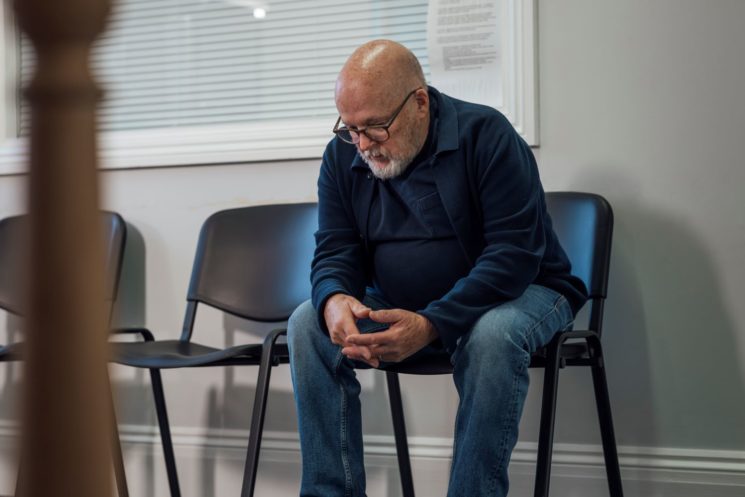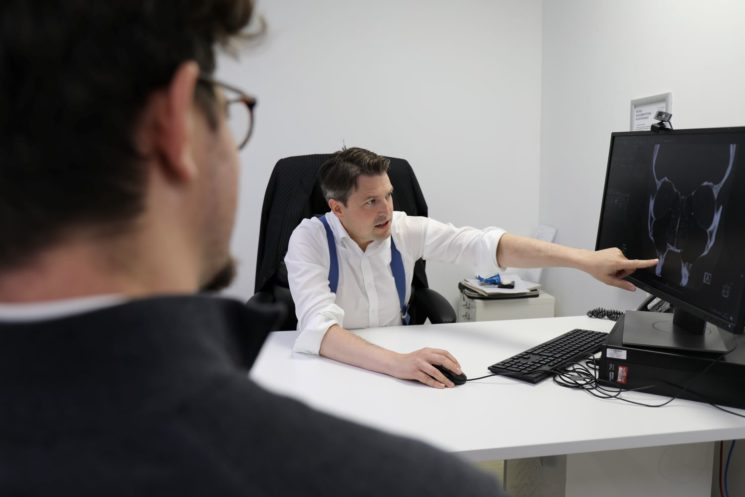
Smoking is the leading cause of lung cancer, with more than 7 in 10 cases directly linked to cigarette use. One of the most beneficial things you can do for your health, and to reduce your risk of lung cancer, is to stop smoking.
When caught and treated at an early stage, lung cancer has much better outcomes for patients. Unfortunately, lung cancer symptoms often don’t develop until the disease has progressed to a later, less curable stage.
Dr James Wilson, Consultant Clinical Oncologist and founding member of the Chest and Lung Group, explains what you should do if you’re a current or past smoker worried about developing lung cancer.
How does smoking cause lung cancer?
Cigarette smoke contains over 60 different toxic substances which are known to be carcinogenic (cancer-causing). When inhaled into the lungs, these chemicals damage the DNA in our cells; some chemicals also make it harder for the cells to repair this damage. Over time, this build-up of damage develops into lung cancer.
It’s not only active smokers at risk of developing lung cancer. If you inhale secondhand smoke from other people’s cigarettes – which is known as passive smoking – you are also at an increased risk of cancer.
Tobacco smoke can’t be seen, but it can stay in the air for hours – especially in enclosed spaces. It can also build on surfaces like walls, furniture, clothes, and hair, which is known as thirdhand smoke. This is particularly bad for children, who are more prone to accidentally ingesting this leftover residue.
Even light, occasional, or ‘social’ smoking can increase your risk of lung cancer, which is why it’s best for your health – and others’ health – not to smoke at all.
Can you get lung cancer without smoking?
Yes, you can get lung cancer without smoking – although it’s much less likely. Up to 15% of lung cancer cases occur in people who have never smoked.
Possible risk factors in non-smokers who develop lung cancer include:
- air pollution
- exposure to chemicals like radon or asbestos
Does vaping cause lung cancer?
While we don’t have enough evidence yet to conclude that vaping increases your chance of developing lung cancer, it’s not risk-free either.
You might see vapes (also known as e-cigarettes) recommended to people who are trying to quit smoking. This is because, while vapes still contain nicotine, they don’t contain tobacco – which is the most harmful, cancer-causing substance found in traditional cigarettes.
However, vapes contain a lot of other chemicals which haven’t yet been as closely studied for their impact on lung health. Other types of lung disorders have been linked to vaping, including a chronic disease informally known as ‘popcorn lung’ – where the small airways become inflamed.
If you’re looking to quit smoking, there are alternative tools available such as nicotine replacement therapy (NRT) and prescription medications to reduce cravings.
How can I reduce my risk of lung cancer?
The number one step you can take to reduce your risk of developing lung cancer is to stop smoking. There are many over-the-counter products available to help you stop smoking – such as nicotine replacement gum, patches, and lozenges – but you can also schedule an appointment with your GP if you need more support.
However, even if you’ve stopped smoking, you’re still at a greater risk of developing lung cancer than someone who has never smoked. If you’re worried about developing lung cancer, a lung cancer screening can provide you with peace of mind by detecting any abnormalities at an earlier stage, when lung cancer is more treatable.
Should I have a lung cancer screening?
Lung cancer has better outcomes for patients when caught and treated early. Unfortunately, by the time a person is displaying symptoms, it is often harder to successfully treat.
At Cromwell Hospital, we provide a lung cancer screening service for the early detection of lung cancer. This is aimed at asymptomatic people who currently smoke, or have smoked in the past, aged 55 and over.
Our one-stop service, which includes a consultation and CT scan, takes place on the same day at our west London hospital. Your results will be reviewed by a multidisciplinary team of specialists – including oncologists, surgeons, and respiratory consultants – for the most informed input into your care. You will then be invited to a follow-up consultation to discuss your next steps.
Depending on the outcome, you may receive a preventative care plan to help reduce your risk, or you will be referred to our state-of-the-art cancer centre for further treatment.
This self-pay only service is offered at a fixed-price fee which includes all your consultations and CT scan.



